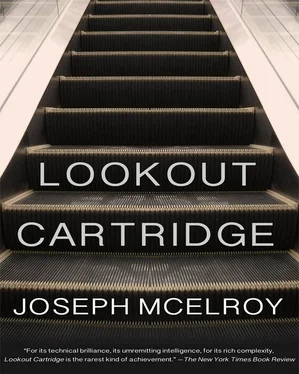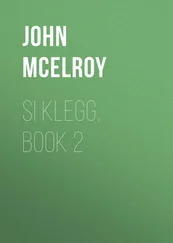Joseph McElroy - Lookout Cartridge
Здесь есть возможность читать онлайн «Joseph McElroy - Lookout Cartridge» весь текст электронной книги совершенно бесплатно (целиком полную версию без сокращений). В некоторых случаях можно слушать аудио, скачать через торрент в формате fb2 и присутствует краткое содержание. Год выпуска: 2014, ISBN: 2014, Издательство: Dzanc Books, Жанр: Современная проза, на английском языке. Описание произведения, (предисловие) а так же отзывы посетителей доступны на портале библиотеки ЛибКат.
- Название:Lookout Cartridge
- Автор:
- Издательство:Dzanc Books
- Жанр:
- Год:2014
- ISBN:9781941088036
- Рейтинг книги:3 / 5. Голосов: 1
-
Избранное:Добавить в избранное
- Отзывы:
-
Ваша оценка:
- 60
- 1
- 2
- 3
- 4
- 5
Lookout Cartridge: краткое содержание, описание и аннотация
Предлагаем к чтению аннотацию, описание, краткое содержание или предисловие (зависит от того, что написал сам автор книги «Lookout Cartridge»). Если вы не нашли необходимую информацию о книге — напишите в комментариях, мы постараемся отыскать её.
Lookout Cartridge — читать онлайн бесплатно полную книгу (весь текст) целиком
Ниже представлен текст книги, разбитый по страницам. Система сохранения места последней прочитанной страницы, позволяет с удобством читать онлайн бесплатно книгу «Lookout Cartridge», без необходимости каждый раз заново искать на чём Вы остановились. Поставьте закладку, и сможете в любой момент перейти на страницу, на которой закончили чтение.
Интервал:
Закладка:
I looked at the pad. The woman would not be Claire. But was she phoning for Claire, or did Claire at least know about the call, or had Claire herself not received my bait?
I’m trying to entertain you, I said to Sub, but heard in the dark side of my head looping at too few revs per moment in my first words, if anything happens . So listen, I got the name of the Knightsbridge gallery and went. I didn’t see any Indian. I liked a picture signed Jan Graf. Wondering where the Indian was, I asked the girl at the desk who Jan Graf might be.
Monty Graf’s grandma, said Sub.
Who but the wife of the gallery owner. And the owner is Mr. Aut, an American. Not Phil Aut, said I. Yes indeed, said the girl. But the visit isn’t over. For on the way out I bump into an Indian or Pakistani — probably the Indian; and I am sure I’ve seen him before only he looks bigger now in the gallery.
Ruby screamed and started to cry, and Sub jumped.
I have written too much. I have moved too slowly. If only I could have reduced my talk with Sub to a single picture framing say diary pages of mine lying in an open suitcase on a couch recomposed by Myma and a cluttered corner of Sub’s desk with his personalized checkbook open beside the portable radio he gave Rose for her birthday once which this very morning I had been able to reach without getting out of my day bed.
Tris was saying in the living room, Now you’re a member of the secret group, and Ruby said, Look what he put on my hand.
Sub said, I told you to put away the printing set.
He sounded calmer.
I asked if he got our college alumni review. He said he threw it away instantly.
I heard again the urgency of Dagger’s words phoning in the middle of Jenny being difficult Monday night: Let Claire alone, she’s got her job. Our film made trouble for her. She doesn’t know all that’s going on.
I could have told Dagger about Claire’s cable. But I didn’t.
YELLOW FILTER INSERT
Between Ruby and Tris on Ruby’s bed, I am also between them and their father, who is in the living room on the day bed couch having a stiff whiskey.
Ruby in a canary nightgown and broad-brimmed white straw hat with cornflowers round the crown wants me to tell about when Sub and I were children. Tris, who goes to bed later and would not normally be in Ruby’s room at this hour, wants to hear how Dagger got his name. Really Tris wants some extensive conversation he can’t quite envision. He has heard that Dagger is the one I made the film with, that Dagger was a police reporter in California, a beachcomber in the Bahamas, and in the Med a dealer in certain articles including semipriceless eighteenth-century French maps of the Thames estuary. Tris leans back against the bedside wall, his hiking boots of unfinished hide crossed just beyond Ruby’s blanket; on his lap is a king-size paperback open at diagrams of home-made booby traps.
Ruby says, I want how you and Daddy hid in the snowdrift.
No, says Tris. How Dagger got his name.
No. Daddy.
My mom has the best camera you can buy and she has a darkroom and develops her own pictures. Do you know a lot about photography?
Dagger DiGorro knows all about it. I just take pictures. I don’t develop them.
Does Dagger develop his?
Tell about Daddy when you were little.
Dagger develops his own, yes.
Do movies get developed too? You have a yellow lens for your camera. I saw it. Is that like wearing sunglasses?
It’s a filter, not a lens. OK, one story for Ruby, one for Tris.
Did someone else develop your movie? But I thought you lost it.
We had a bit developed. Almost all the rest was ruined before we could process it.
Why do you live in England?
I just do.
Tell about the snowdrift, complains Ruby.
Tris while talking stares at cartoon-scrawl diagrams of booby traps.
Ruby’s got to go to bed, he says. It’s eight-thirty. I do not.
Sweet dreams, Ruby.
She reaches across my lap for Tris’s hand and punches his book.
Well, Ruby, it used to snow a lot in New York in those days and we lived in Brooklyn Heights which is still the nicest part of Brooklyn, quiet streets of houses, children playing outside but not so many now. The snowdrifts along the sides of the street got even higher when the snowplow came through trying to clear the street. The snowdrifts were long and high and thick, and we tunneled out the insides of the drifts and sat in there snug as a squirrel in a tree trunk and listened to cars come slushing down our dead-end street.
What’s a dead-end street? said Tris.
You know what a dead-end street is. In England it’s called a cul-de-sac. It doesn’t go through to another street, you have to turn around at the end and come back.
Oh.
A car, maybe a truck, would come by and park further on, or turn around and come back, or it might stop right by us, but parking was hard because of the snowdrifts.
Ruby rubs closer to me, hand on my leg, scraps of bright red nail polish, a clean leg soft through the pale yellow nightie. I like children and this isn’t the first time in England or America I’ve introduced this snowdrift intact into a child’s room. Jenny and Will have heard this one more than once. There’s really nothing to it. Think of what I leave out — the lunch Sub and I took into the tunnel was toasted cheese-bacon-and-tomato sandwiches, we had dark blue corduroys on for we’d refused to wear snowsuit pants this year, and Boyd, who played with us, still wore snowpants, maroon they were, but that was why we left him out that January day so cold it seemed to still the traffic in other blocks and the warning honks in the harbor where there floated in close to our Brooklyn docks great floors of ice which we said we’d use as rafts or aim like icebergs at the Queen Mary or the Normandy when one of those famous lengths appeared between the Statue of Liberty and the tip of Manhattan and as if by scale more than size cut off the gray waterfront of Jersey City. I haven’t stopped talking, I’m telling about Boyd coming up to us wiping his nose on his mitten and sleeve and saying, Hey are you guys my friends?
We looked at him over our sandwiches and looked at each other and at our sandwiches, and I said, Gee I don’t know, Boyd, and Sub shrugged and said, Let’s have our lunch in the tunnel, and when Boyd asked if he could come — which was just as foolish to ask as about being friends, because we were sort of friends and Boyd had helped dig the tunnel — we said Sorry, Boyd, we got to discuss a plan, we’ll see you later.
We climbed over the drift to get to the entrance which was on the street side so we could be private from people walking by on the sidewalk. We crawled in on two knees and one hand, holding our sandwiches and finished them in no time with Boyd squatting at the tunnel mouth watching. Then we decided to close the entrance and we dug into a mound we’d left inside the entrance when we were lengthening the tunnel.
Tris and Ruby don’t want to hear how stony-hard the crust of that pile was so that at first we couldn’t get hold of enough snow to block the entrance but then, with both pulling, the whole piece came away like a boulder and we jammed it perfectly into the hole and our den was a bluish dark yet shadowy white too, shutting out Boyd’s dripping red nose and damp yellow mittens.
I wish I had a snowhouse.
It was cold in there. Boyd kept saying, Hey come on, you guys, you discussed your plan, lemme come in there now, can I? And we said Not yet, Boyd, and tried not to giggle because if he’d heard that, he’d have tried to bash his way in, and he was bigger.
How old were you? said Tris.
Eight. Just a year older than you, Ruby. I guess the drift was small inside but it seemed big. Well, Boyd wasn’t there after a while, and I was cold and thinking my mother could make us some of her special hot chocolate with marshmallow, but we were discussing whether we’d join the Boy Scouts when we were eleven going on twelve.
Читать дальшеИнтервал:
Закладка:
Похожие книги на «Lookout Cartridge»
Представляем Вашему вниманию похожие книги на «Lookout Cartridge» списком для выбора. Мы отобрали схожую по названию и смыслу литературу в надежде предоставить читателям больше вариантов отыскать новые, интересные, ещё непрочитанные произведения.
Обсуждение, отзывы о книге «Lookout Cartridge» и просто собственные мнения читателей. Оставьте ваши комментарии, напишите, что Вы думаете о произведении, его смысле или главных героях. Укажите что конкретно понравилось, а что нет, и почему Вы так считаете.












